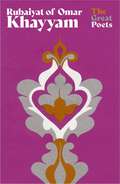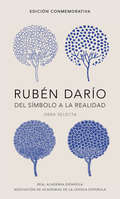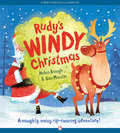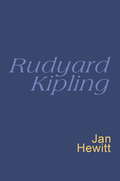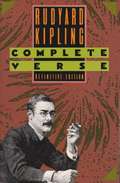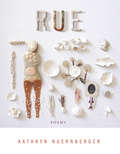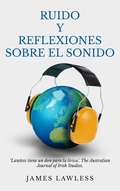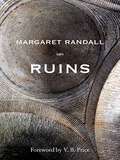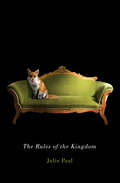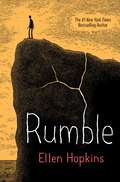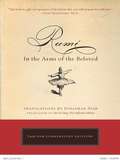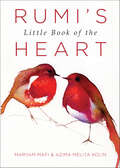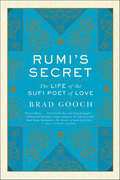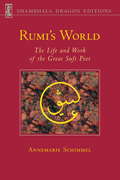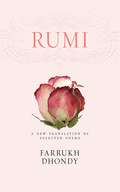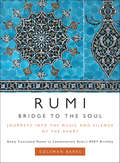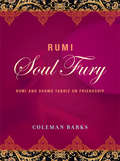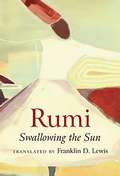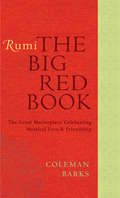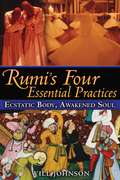- Table View
- List View
Roy Campbell: Selected Poems
by Joseph Pearce Roy CampbellA collection of Roy Campbell's works selected by Joseph Pearce.
Rubaiyat of Omar Khayyam (The Great Poets)
by Omar KhayyamThe best-loved, bestselling poem ever published, brought up to date with a sumptuous new look.Edward FitzGerald's much-loved, often-quoted, bestselling 1859 translation of the RUBAIYAT, with Attar's charming narrative poem, BIRD PARLIAMENT. Also featuring an extensive new introduction with notes and chronology.Awake! for Morning in the Bowl of NightHas flung the Stone that put the Stars to Flight:And Lo! the Hunter of the East has caughtThe Sultan's Turret in a Noose of Light.
Rubaiyat of Omar Khayyam: Rendered Into English Quatrains By E. , Fitzgerald. A Reprint In Full Of The First Edition, 1859, Of The Second Edition, 1868, And Of The Fifth Edition, 1889, Together With Notes Indicating The Minor Variants [found In The T (The Great Poets)
by Omar KhayyamThe best-loved, bestselling poem ever published, brought up to date with a sumptuous new look.Edward FitzGerald's much-loved, often-quoted, bestselling 1859 translation of the RUBAIYAT, with Attar's charming narrative poem, BIRD PARLIAMENT. Also featuring an extensive new introduction with notes and chronology.Awake! for Morning in the Bowl of NightHas flung the Stone that put the Stars to Flight:And Lo! the Hunter of the East has caughtThe Sultan's Turret in a Noose of Light.
Rubén Darío, del símbolo a la realidad (Edición conmemorativa de la RAE y la ASALE)
by Rubén DaríoNueva edición conmemorativa de la Real Academia Española y la Asociación de Academias de la Lengua Española para celebrar el centenario del fallecimiento de Rubén Darío, uno de los escritores hispanohablantes más importantes del siglo XX. Publicada con ocasión de la celebración del VII Congreso de la Lengua Española en Puerto Rico. Rubén Darío es uno de los escritores en lengua española más populares a ambos lados del océano Atlántico. Su poesía y su narrativa constituyen uno de los principales exponentes del movimiento modernista. Sin embargo, la dimensión literaria de Rubén Darío desborda el ámbito de la ficción. Su labor como corresponsal, llevada a cabo durante gran parte de su vida, propició la escritura de interesantes crónicas en las que el autor ofrece una inteligente visión de su realidad. La presente antología incluye los textos íntegros de los poemarios Prosas profanas y otros poemas y Cantos de vida y esperanza. Los cisnes y otros poemas, y el libro de crónicas Tierras solares, que recoge las publicadas para el diario argentino La Nación sobre su tercera visita a España (1904) y las escritas durante su viaje por Bélgica, Alemania, Austria-Hungría e Italia en el mismo año. La edición presenta estudios complementarios escritos por algunos de los principales críticos, escritores y académicos españoles e hispanoamericanos, además de un glosario, un índice de nombres propios y una bibliografía selecta sobre la obra de Darío. ------------ Ediciones conmemorativas de la Real Academia Española y la Asociación de Academias de la Lengua Española En 2004 y coincidiendo con la celebración del IV Centenario de la publicación de la primera parte de Don Quijote de la Mancha, la Real Academia Española y la Asociación de Academias de laLengua Española dieron inicio a un proyecto de edición de grandes obras de la literatura en español. Concebida como una línea de ediciones conmemorativas ocasionales y de circulación limitada de los grandes clásicos hispanos de todos los tiempos, dichas obras son publicadas y distribuidas en todo el mundo de habla hispana. Rubén Darío. Del símbolo a la realidad se une ahora a esta colección de la que ya forman parte Don Quijote de la Macha, de Miguel de Cervantes, reeditada en 2015 con ocasión del IV centenario de Cervantes; Cien años de soledad de Gabriel García Márquez; La región más transparente, de Carlos Fuentes; Antología general , de Pablo Neruda; Gabriela Mistral en verso y prosa, una antología de la autora; La ciudad y los perros de Mario Vargas Llosa y La colmena, de Camilo José Cela. ------------
Rudy's Windy Christmas
by Ben Mantle Helen BaughWhile Santa and Mrs. Claus eat their dinner, Santa sneakily feeds his sprouts to one of the reindeer rather than eating them himself. The result is, uh, smelly, to say the least. Now, Rudy can't seem to stop releasing windy pops from his backside as he and the other reindeer help Santa deliver presents on Christmas Eve. The rest of the reindeer are downwind from Rudy and they are not handling the sprouty wiffs so well. They laugh so heartily at Rudy's rear-end trumpet that they simply cannot fly the sleigh as usual. It's up to Rudy's super-turbo gas to get them back to the North Pole.
Rudyard Kipling: Everyman Poetry
by Rudyard KiplingIncludes the ever popular "If", along with the best of Kipling's powerful, fluent poetry.
Rudyard Kipling: Everyman's Poetry (Everyman Poetry Ser. #No. 45)
by Rudyard Kipling Jan HewittIncludes the ever popular "If", along with the best of Kipling's powerful, fluent poetry.
Rudyard Kipling: The Complete Verse
by Rudyard KiplingAll of Kipling's well-known and well-loved poems like "Gunga Din" and "If" are here like old friends. So are the poems from all of his books and all previous collections. His most hated poems, his most imperialist and racist are here for anyone looking for an excuse to hate him. But here too are a number of truly great, insightful poems; many in the form of dramatic personae, which make it easy to understand why TS Eliot one of the greatest of modern poets, found so much to praise that he anthologized some of what he considered some of Kipling's best, adding his voice to the growing chorus demanding a reevaluation of his place in the history of British and world poetry.
Rue (American Poets Continuum #176)
by Kathryn NuernbergerIn this fiercely feminist ecopoetic collection, Kathryn Nuernberger reclaims love and resilience in an age of cruelty. As the speaker—an artist and intellectual—finds herself living through a rocky marriage in conservative rural Missouri, she maintains her sense of identity by studying the science and folklore of plants historically used for birth control. Her ethnobotanical portraits of common herbs like Queen Anne’s lace and pennyroyal are interwoven with lyric biographies of pioneering women ecologists whose stories have been left untold in textbooks. With equal parts righteous fury and tender wisdom, Rue reassesses the past and recontextualizes the present to tell a story about breaking down, breaking through, and breaking into an honest, authentic expression of self.
Ruido y Reflexiones sobre el Sonido
by James Lawless Rocío García Romero¿Qué es el ruido? ¿Qué sucede cuando se mete dentro de la cabeza? En esta divertida historia marcada por el patetismo de unas Reflexiones sobre el Sonido, James Lawless retrata con su peculiar humor algunos de los efectos del sonido en la sociedad actual, seguido del decadente poema Ruido, cuyos versos incansables exploran la devastación que produce en las personas sensibles una cacofonía fuera de control.
Ruins (Mary Burritt Christiansen Poetry Series)
by Margaret RandallIn this poetry collection, Margaret Randall uses the metaphor of ruins to meditate on time's movement--through memory, through cities, through the leavings of history, and through the bodies of people who have experienced time's transformations and traumas. Randall's ruins include not only Chaco Canyon, Hovenweep, Teotihuacan, Machu Picchu, Kiet Siel, Petra, and sites in ancient Greece and Egypt, but also Auschwitz-Birkenau and lives shattered by torture and oppression.Always there is that moment of arrival, as another reality rises before me, superimposed upon the one I live today. Sometimes the membrane is torn, and I find myself moving in and out. Boundaries dissolve. A mysterious space, between then and now, warns as it invites: promising revelation and maybe also fresh trauma if I am willing to risk its secrets.--Margaret Randall, in the Introduction
Rules of the Kingdom
by Julie PaulA lapsed religion still emits / faint signals; God, / in his satellite dish, / groans / moving on. To seek belonging, to strain against the familiar – these are the polarities many of us live between, feeling the pull of each desire. Offering a particular history, an intimate vantage point from within the various kingdoms we inhabit, Julie Paul’s The Rules of the Kingdom is an exploration of this struggle on a personal level and a universal one. Broken into five sections, the book examines the human struggle to find meaning, comfort, and a sense of home. In “Settlers’ Descendant Reclaims the Past,” the poems consider rural life, both the specific and the collective, including a village’s destruction by fire. In “Weight of the Word” the focus turns to family of origin, religion, and rites of passage. Poems take a familial tack again in “Cleavage,” wherein Paul dives into the waters of motherhood, and they drift into further intimacy in “The World’s Smallest Republic,” a series of poems about sex, love, and marriage. Finally, the poems in the fifth section, “Next Time the World Will Burn,” explore our place in the twenty-first century and offer some idiosyncratic suggestions on how to live. At turns humorous, playful, contemplative, and coy, the poems in The Rules of the Kingdom question the vagaries of faith and family but ultimately celebrate life and love.
Rules of the Kingdom (Hugh MacLennan Poetry Series #39)
by Julie PaulA lapsed religion still emits / faint signals; God, / in his satellite dish, / groans / moving on. To seek belonging, to strain against the familiar – these are the polarities many of us live between, feeling the pull of each desire. Offering a particular history, an intimate vantage point from within the various kingdoms we inhabit, Julie Paul’s The Rules of the Kingdom is an exploration of this struggle on a personal level and a universal one. Broken into five sections, the book examines the human struggle to find meaning, comfort, and a sense of home. In “Settlers’ Descendant Reclaims the Past,” the poems consider rural life, both the specific and the collective, including a village’s destruction by fire. In “Weight of the Word” the focus turns to family of origin, religion, and rites of passage. Poems take a familial tack again in “Cleavage,” wherein Paul dives into the waters of motherhood, and they drift into further intimacy in “The World’s Smallest Republic,” a series of poems about sex, love, and marriage. Finally, the poems in the fifth section, “Next Time the World Will Burn,” explore our place in the twenty-first century and offer some idiosyncratic suggestions on how to live. At turns humorous, playful, contemplative, and coy, the poems in The Rules of the Kingdom question the vagaries of faith and family but ultimately celebrate life and love.
Rumble
by Ellen HopkinsCan an atheist be saved? The New York Times bestselling author of Crank and Tricks explores the highly charged landscapes of faith and forgiveness with brilliant sensitivity and emotional resonance."There is no God, no benevolent ruler of the earth, no omnipotent grand poobah of countless universes. Because if there was...my little brother would still be fishing or playing basketball instead of fertilizing cemetery vegetation." Matthew Turner doesn't have faith in anything. Not in family--his is a shambles after his younger brother was bullied into suicide. Not in so-called friends who turn their backs when things get tough. Not in some all-powerful creator who lets too much bad stuff happen. And certainly not in some "It Gets Better" psychobabble. No matter what his girlfriend Hayden says about faith and forgiveness, there's no way Matt's letting go of blame. He's decided to "live large and go out with a huge bang," and whatever happens happens. But when a horrific event plunges Matt into a dark, silent place, he hears a rumble...a rumble that wakes him up, calling everything he's ever disbelieved into question.
Rumi
by Jonathan StarLandmark translations of the Sufi poet/mystic Rumi from the acclaimed interpreter of the Tao Te Ching. Jonathan Star has assembled selections of Rumi?s verse in a treasury that spans the poet?s life and includes his most celebrated and poignant work. It is an enchanting volume of classic Eastern thought that creates an exhilarating experience for all readers. .
Rumi's Little Book of the Heart
by Maryam Mafi and Azima Melita KolinIn this slender volume, Rumi explores the joy of friendship and the agony of loss. These poetic meditations on the most profound of human relationships are like crystals: they sparkle with the many hues of the rainbow and contain worlds within, capturing us with their mystery.Here are poems that cause us to reflect on our own relationships, to experience again the intensity of friendship, the ache of loss, and the profundity of immersion.This is a book for poetry lovers, Rumi fans, and all gift-giving occasions; a book to treasure and to share.Previously published in hardcover as Whispers of the Beloved.Imitating others,I failed to find myselfI looked inside and discoveredI only knew my name.When I stepped outsideI found my real Self.Replaces ISBN 9781571746825.
Rumi's Secret: The Life of the Sufi Poet of Love
by Brad GoochA biography of the Sufi poet that’s “a dazzling feat of scholarship . . . the book restores Rumi to the glories and hardships of his momentous age” (The Washington Post).Ecstatic love poems of Rumi, a Persian poet and Sufi mystic born over eight centuries ago, are beloved by millions of readers in America as well as around the world. He has been compared to Shakespeare for his outpouring of creativity and to Saint Francis of Assisi for his spiritual wisdom. Yet his life has long remained the stuff of legend rather than intimate knowledge.In this breakthrough biography, New York Times–bestselling author Brad Gooch brilliantly brings to life the man and puts a face to the name Rumi, vividly coloring in his time and place—a world as rife with conflict as our own. The map of Rumi’s life stretched over 2,500 miles. Gooch traces this epic journey from Central Asia, where Rumi was born in 1207, traveling with his family, displaced by Mongol terror, to settle in Konya, Turkey. Pivotal was the disruptive appearance of Shams of Tabriz, who taught him to whirl and transformed him from a respectable Muslim preacher into a poet and mystic. Their vital connection as teacher and pupil, friend and beloved, is one of the world’s greatest spiritual love stories. When Shams disappeared, Rumi coped with the pain of separation by composing joyous poems of reunion, both human and divine.Ambitious, bold, and beautifully written, Rumi’s Secret reveals the unfolding of Rumi’s devotion to a “religion of love,” remarkable in his own time and made even more relevant for the twenty-first century by this compelling account.
Rumi's World: The Life and Works of the Greatest Sufi Poet
by Annemarie SchimmelThis book (previously published as I Am Wind, You Are Fire) celebrates the extraordinary career of Persia's great mystical poet, Rumi (1207-1273), through the story of his life, along with an enlightening examination of his ecstatic verse. Rumi lived the quiet life of a religious teacher in Anatolia until the age of thirty-seven, when he came under the influence of a whirling dervish, Shams Tabriz, and was moved to a state of mystical ecstasy. One of the results of this ecstasy was a prodigious output of poems about the search for the lost Divine Beloved, whom Rumi identified with Shams. To symbolize this search, Rumi also invented the famous whirling dance of the Melevi dervishes, which are performed accompanied by the chanting of Rumi's poems. Professor Schimmel illuminates the symbolism and significance of Rumi's vast output and offers her own translations of some of his most famous poems.
Rumi: A New Translation of Selected Poems
by Rumi Farrukh DhondyChampioned by the likes of Madonna, Donna Karan, and Deepak Chopra, Rumi has won such a following in this country that a few years ago he was proclaimed our bestselling poet. But translations that have popularized the work of this thirteenth-century Sufi mystic have also strayed from its essence. In this new translation, Farrukh Dhondy seeks to recover both the lyrical beauty and the spiritual essence of the original verse. In poems of love and devotion, rapture and suffering, loss and yearning for oneness, Dhondy has rediscovered the Islamic mystic of spiritual awakening whose quest is the key to his universal appeal. Here is at once a great poet of love, both human and divine, and the authentic voice of a moderate Islam--a voice that can resonate in today's turbulent, fundamentalist times.
Rumi: Bridge to the Soul
by Coleman Barks2007 is the "Year of Rumi," and who better than Coleman Barks, Rumi's unlikely, supremely passionate ambassador, to mark the milestone of this great poet's 800th birthday? Barks, who was recently awarded an honorary doctorate in Persian language and literature by the University of Tehran for his thirty years of translating Rumi, has collected and translated ninety new poems, most of them never published before in any form. The result is this beautiful edition titled Rumi: Bridge to the Soul. The "bridge" in the title is a reference to the Khajou Bridge in Isphahan, Iran, which Barks visited with Robert Bly in May of 2006--a trip that in many ways prompted this book. The "soul bridge" also suggests Rumi himself, who crosses cultures and religions and brings us all together to listen to his words, regardless of origin or creed. Open this book and let Rumi's poetry carry you into the interior silence and joy of the spirit, the place that unites conscious knowing with a deeper, more soulful understanding.
Rumi: Soul Fury
by Coleman BarksThis is how the heart sounds. Do not change the melody, this now, you and I, here together. Let this being with each other be heart-sound.The evocative, spiritual poetry of thirteenthcentury Sufi mystic Rumi has inspired people for centuries, and Coleman Barks' stunning translations are unparalleled. This exquisite new collection speaks to the mystery of soul friendship, specifi cally between Rumi and Shams Tabriz, and universally in the relationships we all share.Jelaluddin Rumi and Shams Tabriz met in 1244 and began a mystical, divine friendship, one not bound to time and space and despite their diff erences. Where Rumi was introspective, loving, and embodied peace and kindness, Shams was wild, brash, and honest--full of a fi ery passion Barks calls "soul fury." Together they shared an eternal friendship that resulted in Rumi's luminous quatrains and the wise Sayings of Shams Tabriz, giving language to the delight of true friendship.s their divine yearnings. Joyous and contemplative, provocative and playful, Rumi: Soul Fury is a sterling addition to the modern Rumi oeuvre, and is sure to be embraced by his wide and devoted readership.
Rumi: Swallowing the Sun
by Franklin Dean LewisTimeless and eternal, the poetry of Jalal al-Din Rumi is loved the world over, making him the best selling poet from America to Tajikistan. In this beautifully presented volume of new translations, Franklin D. Lewis draws from the great breadth of his work, in all its varied aspects and voices. Working directly from the original Persian, Lewis brings to this translation not only the latest scholarship in Persian and English, but a deftness and lightness of touch that allows for a profound sensitivity to Rumi's mystical and philosophical background.Complete with a detailed introduction and notes, this is a perceptive, insightful, and deeply moving collection that will prove inspirational to both keen followers of Rumi's work and readers discovering the great poet for the first time.
Rumi: The Big Red Book
by Coleman BarksConsidered one of the masterpieces of world literature, The Big Red Book is perhaps the greatest work of Rumi, the medieval Sufi mystic who also happens to be the bestselling poet in America. Rumi was born in 1207 to a long line of Islamic theologians and lawyers on the eastern edge of the Persian Empire in what is now Afghanistan. In order to escape the invading Mongol armies of Genghis Khan, his family moved west to a town now found in Turkey, where he eventually became the leader of a school of whirling dervishes. It was a fateful day in 1244 when he met Shams Tabriz, a wild mystic with rare gifts and insight. The renowned scholar Rumi had found a soul mate and friend who would become his spiritual mentor and literary muse. "What I had thought of before as God," Rumi said, "I met today in a human being." Out of their friendship, Rumi wrote thousands of lyric poems and short quatrains in honor of his friend Shams Tabriz. They are poems of divine epiphany, spiritual awakening, friendship, and love. For centuries, Rumi's collection of these verses has traditionally been bound in a red cover, hence the title of this inspired classic of spiritual literature.
Rumi: The Big Red Book
by Coleman BarksConsidered one of the masterpieces of world literature, The Big Red Book is perhaps the greatest work of Rumi, the medieval Sufi mystic who also happens to be the bestselling poet in America. Rumi was born in 1207 to a long line of Islamic theologians and lawyers on the eastern edge of the Persian Empire in what is now Afghanistan. In order to escape the invading Mongol armies of Genghis Khan, his family moved west to a town now found in Turkey, where he eventually became the leader of a school of whirling dervishes. It was a fateful day in 1244 when he met Shams Tabriz, a wild mystic with rare gifts and insight. The renowned scholar Rumi had found a soul mate and friend who would become his spiritual mentor and literary muse. "What I had thought of before as God," Rumi said, "I met today in a human being."Out of their friendship, Rumi wrote thousands of lyric poems and short quatrains in honor of his friend Shams Tabriz. They are poems of divine epiphany, spiritual awakening, friendship, and love. For centuries, Rumi's collection of these verses has traditionally been bound in a red cover, hence the title of this inspired classic of spiritual literature.
Rumi’s Four Essential Practices: Ecstatic Body, Awakened Soul
by Will JohnsonPoems and commentary that open the door for a new generation to experience the ecstatic and embodied spiritual truths contained in Rumi’s poetry • Reveals how the four practices of eating lightly, breathing deeply, moving freely, and gazing intently can invoke the divinity within us all • Explains how these practices dissolve the self’s need for identity so that we may experience a state of transcendent ecstasy and union with the divine • Takes Rumi’s path to finding God from theoretical to embodied practices The great thirteenth-century Sufi mystic and poet Jalaluddin Rumi began his life as an orthodox Islamic believer but felt that to fully experience complete union with the divine he must abandon institutionalized religion and its prescribed forms of worship. Surrendering his will to his overriding urge for a much more immediate, intuitive, and compelling union with the divine, he found that by manipulating certain behavioral aspects of his physiology--eating lightly, breathing deeply, moving freely, and gazing raptly--he was capable of loosening the rigid confines of the self, thereby overriding its limitations and achieving a transcendent merging with his own divinity. His message is simple: if you wish to affect the spirit, you must first make changes in the way your body responds to the world. Through clearly written commentary interspersed with Rumi’s beautiful poems, this book details these four practices in a very precise way. As such, it is a sweet and open invitation to follow the examples set forth in order to embark upon one’s own path of inner illumination. The freshness of Rumi’s poetry dissolves the 700 years that separate his life from our own time, making his message as pertinent today as when he walked the streets of Konya, Anatolia (present-day Turkey), reciting his inspiring verse. This book allows us, through Rumi’s gentle guidance, to touch the face of God that resides deep within us all.

